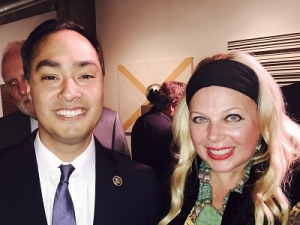
Congressman Castro (D-TX 20th District) with Edwina Rogers, CEO SPI
SPI is wasting no time now that Congress is back in session. ┬áOn Wednesday, September 9th we made the rounds in the House and Senate to discuss assistance for the nearly 50 bloggers on the “kill list.” ┬áIn 2013, a list of non-theists, freethinkers, anti-Jamaatis and secular bloggers was been widely circulated; this was the hit list drawn up by Islamic fundamentalist groups.
This week coalition members are being asked to sign on to a letter to the UN High Commissioner for Refugees in a direct appeal for the bloggers in need of asylum.  Congressman Castro, who has offered his assistance through the Foreign Affairs Committee.
The Hill is back to business!
Congress resumed their session now that Labor Day is over and its 535 lawmakers will face one of the most convoluted legislative tangles in recent memory. While there is no clear endgame yet, all parties know what must be done and ÔÇö roughly ÔÇö by what time.┬á The clock is ticking.
Up first, the resolution of disapproval for the administrationÔÇÖs Iranian nuclear deal, which must be considered by September 17. Rumors are that House leaders intend to move the resolution concurrently with the defense policy bill (NDAA), which is essentially complete after House and Senate Armed Services Committee conference negotiations this summer.┬á House Republicans are changing course to take up a last-minute plan to oppose the Iran nuclear deal following a revolt from some of the conferenceÔÇÖs conservative members.
Instead of a single vote to disapprove the deal, the House will now hold three separate votes on the agreement.┬á One would be a 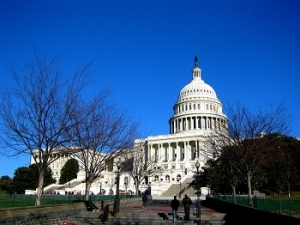 resolution to approve the deal ÔÇö which is sure to fail and, in the process, force many Democrats to break with the White House.┬áThe second would be to express a sense of the House that the Obama administration has not met the requirements of the Iran review legislation by failing to give lawmakers the text of separate agreements between Iran and the International Atomic Energy Agency (IAEA). Those bilateral side deals, which concern the details of inspections at some Iranian sites, are at the center of the HouseÔÇÖs uprising over the Iran pact.┬á Finally, the House would vote to prevent the U.S. from lifting sanctions on Iran as part of complying with the nuclear deal. ┬á The House is still expected to finish votes regarding Iran on Friday, which is the 14th anniversary of the 9/11 terror attacks.
resolution to approve the deal ÔÇö which is sure to fail and, in the process, force many Democrats to break with the White House.┬áThe second would be to express a sense of the House that the Obama administration has not met the requirements of the Iran review legislation by failing to give lawmakers the text of separate agreements between Iran and the International Atomic Energy Agency (IAEA). Those bilateral side deals, which concern the details of inspections at some Iranian sites, are at the center of the HouseÔÇÖs uprising over the Iran pact.┬á Finally, the House would vote to prevent the U.S. from lifting sanctions on Iran as part of complying with the nuclear deal. ┬á The House is still expected to finish votes regarding Iran on Friday, which is the 14th anniversary of the 9/11 terror attacks.
Next up, after these two major items will come a spending bill of some kind so the federal government does not shut down. A one-month (maybe longer) Continuing Resolution (CR) to prevent a government shutdown on October 1 is the most likely path.  Another way to prevent government shutdown is by defunding Planned Parenthood, a measure which would delight conservatives.
Sen. Rand Paul of Kentucky, whoÔÇÖs seeking the GOP presidential nomination, will headline a rally with several pro-life groups outside the Capitol on Thursday, calling on Congress to cut off funding for Planned Parenthood in the spending bill that must be passed by Oct. 1 to avert a shutdown.”If we shut down government it will be because you have willful Republicans who are prepared to take the government hostage to attain their ends,” Hoyer told reporters in the Capitol. “It will not be a stumble, it will be a considered objective,” he added, “and a number of them have said so publicly.”
The Planned Parenthood attack begins Thursday, September 10 in the House with a presentation billed Planned Parenthood Exposed: Examining the Horrific Abortion Practices at the Nation’s Largest Abortion Provider.┬á Just some quick facts about Planned Parenthood:┬á Abortions account for only 3% of their total services, 80% of their clients receive services to prevent unplanned pregnancy from occurring, 1 in 5 women in the U.S. has visited a Planned Parenthood at least once in her lifetime, and Planned Parenthood provides nearly 400,000 Pap tests and 500,000 breast exams each year— tests vital in screening for cancer.
Potent political issues include a meeting of the Committee on Oversight and Government Reform titled Violence on the Border:  Keeping U.S. Personnel Safe. According to testimony submitted,The U.S.-Mexico border regions, and the communities within it, are interconnected in many ways. Through collaboration and coordination with our many Federal, state, local, tribal and international government partners, we have made great strides with regard to the integrity and security of our borders, and with the safety of our frontline personnel.
Export-Import Bank re-authorization is another hot topic of debate.┬á As of June, 30, 2015, the bank’s charter expired and was not renewed.┬á This means that its ability to give new commitments is restricted, but it is allowed to administer previous obligations.┬á Basically, Exim is on a very tight leash during the deciding process.┬á A bit of history, since 1934, the Export-Import Bank (Exim) has been the official U.S. export credit┬áagency, financing the purchase of U.S. manufacturing exports by foreign governments┬áand companies when private lenders are unavailable or unwilling.
The defenders of the U.S. Export-Import Bank deserve credit for their message discipline. Since its charter expired on June 30, the businesses and politicians that benefit from it have used the same phrase to try scaring Congress into resurrecting the bank: An America without Ex-Im has ÔÇ£unilaterally disarmedÔÇØ itself.┬á Ex-Im is an example of corporate welfare and business-government collusion, not something that matters to AmericaÔÇÖs standing in the world. It sends tens of billions of taxpayer dollarsÔÇö$20.5 billion last year aloneÔÇöto businesses overseas, supporting less than two percent of the countryÔÇÖs exports along the way. This helps a select few domestic businesses that export their products, but it simultaneously places their competitors and companies in different industries at a disadvantage. The bank also gives billions of taxpayer dollars to companies and countries that are undermining AmericaÔÇÖs national security interests.
The Pope will address Congress later this month. House Speaker John A. Boehner (R-Ohio) said, ÔÇ£It is my great privilege to announce that His Holiness Pope Francis will visit the United States Capitol on Thursday, September 24, 2015. On that day, he will become the first leader of the Holy See to address a joint meeting of Congress. It will be a historic visit, and we are truly grateful that Pope Francis has accepted our invitation.ÔÇØ
Internet Explosion Hits India
India has added 52 million internet users in first six months of the year, taking the total user base to 352 million as on June 30, 2015, industry body IAMAI said.  Interestingly, 213 million (over 60%) users accessed the worldwide web through mobile devices. This will have a colossal effect on access to better information.
See the full story on The Times of India
Do We Trust Scientists?
Researchers asked residents of New Hampshire about their trust of scientists as a source of information about five 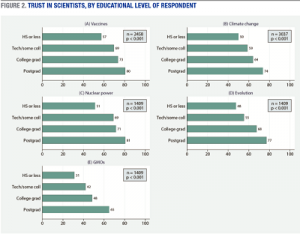 topics:
topics:
vaccines, climate change, nuclear power safety, evolution, and genetically modified organisms. The results, according to the report, “offer modest encouragement regarding public trust in scientists.”
Asked “Would you say that you trust, don’t trust, or are unsure about scientists as a source of information about climate change,” 62% of respondents said that they trust scientists, 23% that they were unsure, and 15% that they do not trust scientists.
Asked “Would you say that you trust, don’t trust, or are unsure about scientists as a source of information about evolution,” 63% of respondents said that they trust scientists, 21% said that they were unsure, and 16% that they do not trust scientists.
For both climate change and evolution, respondents with higher education levels, respondents who identified themselves with the Democratic Party, and respondents who identified themselves as ideologically liberal were more likely to trust scientists.
Obama To Ban Discrimination Against Transgender Patients
 The Obama administration has proposed a rule that would ban discrimination against transgender patients in the healthcare system.  Once finalized, this should expand coverage to include gender transition and prohibit health care facilities from denying transgender people access to restrooms that match their gender identity.  Originally, sex discrimination was only covered under the protective umbrella of this law; new regulation will extend this shield to include gender identity.
The Obama administration has proposed a rule that would ban discrimination against transgender patients in the healthcare system.  Once finalized, this should expand coverage to include gender transition and prohibit health care facilities from denying transgender people access to restrooms that match their gender identity.  Originally, sex discrimination was only covered under the protective umbrella of this law; new regulation will extend this shield to include gender identity.
Seven in ten (70 percent) Americans favor laws that would protect gay, lesbian, bisexual, and transgender people against discrimination in the workplace, public accommodations, and housing. More than 200 cities and counties have issued ordinances that prohibit discrimination by public and private employers based on sexual orientation and gender identity.  According to a survey, voters across party lines overwhelmingly approved of a nondiscrimination law. Republicans supported it 51% to 43%, Independents supported it 72% to 23% and democrats supported it 80% to 18%.
How’s that for National Climate Change?
 Do you enjoy satire?┬á How about enjoy vampires?…I mean, what what vampires used to be before a certain franchise came in and made them all sparkly and lovable?┬á There is a movie being made that can revive the genre, whilst adding a secular twist!┬á Filmmaker,┬áJohn Schuermann, needs help to bring this film to fruition.┬á This is our call to action to support secular film.
Do you enjoy satire?┬á How about enjoy vampires?…I mean, what what vampires used to be before a certain franchise came in and made them all sparkly and lovable?┬á There is a movie being made that can revive the genre, whilst adding a secular twist!┬á Filmmaker,┬áJohn Schuermann, needs help to bring this film to fruition.┬á This is our call to action to support secular film.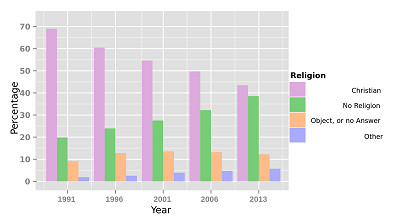
 Which language is going the way of Latin, Sanskrit, and Egyptian Hieroglyphics?┬á SPI Fellow John McWhorter answers this question and explores why a language that once was “the English of its time” is now headed for extinction in his new article seen in The Atlantic,
Which language is going the way of Latin, Sanskrit, and Egyptian Hieroglyphics?┬á SPI Fellow John McWhorter answers this question and explores why a language that once was “the English of its time” is now headed for extinction in his new article seen in The Atlantic, 

 resolution to approve the deal ÔÇö which is sure to fail and, in the process, force many Democrats to break with the White House.┬áThe second would be to express a sense of the House that the Obama administration has not met the requirements of the Iran review legislation by failing to give lawmakers the text of separate agreements between Iran and the International Atomic Energy Agency (IAEA). Those bilateral side deals, which concern the details of inspections at some Iranian sites, are at the center of the HouseÔÇÖs uprising over the Iran pact.┬á Finally, the House would vote to prevent the U.S. from lifting sanctions on Iran as part of complying with the nuclear deal. ┬á The House is still expected to finish votes regarding Iran on Friday, which is the
resolution to approve the deal ÔÇö which is sure to fail and, in the process, force many Democrats to break with the White House.┬áThe second would be to express a sense of the House that the Obama administration has not met the requirements of the Iran review legislation by failing to give lawmakers the text of separate agreements between Iran and the International Atomic Energy Agency (IAEA). Those bilateral side deals, which concern the details of inspections at some Iranian sites, are at the center of the HouseÔÇÖs uprising over the Iran pact.┬á Finally, the House would vote to prevent the U.S. from lifting sanctions on Iran as part of complying with the nuclear deal. ┬á The House is still expected to finish votes regarding Iran on Friday, which is the  topics:
topics: The Obama administration has proposed a rule that would
The Obama administration has proposed a rule that would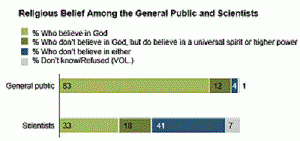 For many, including myself, science served as not only a resource to quench unending curiosity about the mechanics of the universe, origin of species, as well as countless other burning questions about the world we live in as well as the cosmos; science also served as a starting point of my own secular journey.  In years since, meeting countless others who share the same world view, I have found that I am not alone.  Many secularists begin questioning faith through scientific fact.  If x is true, then how can y be true if they contradict?  Is the same true for scientists?  What about philosophers?  Can those immersed in a field where faith is in direct contradiction with fact manage to hold on to belief?
For many, including myself, science served as not only a resource to quench unending curiosity about the mechanics of the universe, origin of species, as well as countless other burning questions about the world we live in as well as the cosmos; science also served as a starting point of my own secular journey.  In years since, meeting countless others who share the same world view, I have found that I am not alone.  Many secularists begin questioning faith through scientific fact.  If x is true, then how can y be true if they contradict?  Is the same true for scientists?  What about philosophers?  Can those immersed in a field where faith is in direct contradiction with fact manage to hold on to belief?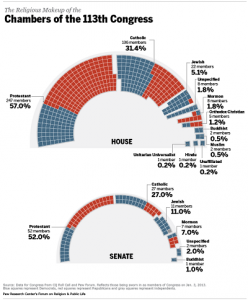 uphold the Constitution and keep their personal beliefs at home, it is clearly seen that the majority of politicians try to appeal to certain demographics come election time.
uphold the Constitution and keep their personal beliefs at home, it is clearly seen that the majority of politicians try to appeal to certain demographics come election time.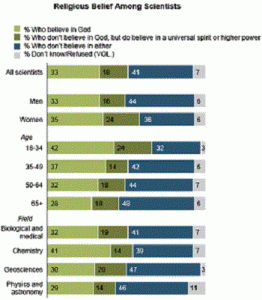 In science, of course, the very word ÔÇ£sacredÔÇØ is profane. No ideas, religious or otherwise, get a free pass. The notion that some idea or concept is beyond question or attack is anathema to the entire scientific undertaking. This commitment to open questioning is deeply tied to the fact that science is an atheistic enterprise. ÔÇ£My practice as a scientist is atheistic,ÔÇØ the biologist J.B.S. Haldane wrote, in 1934. ÔÇ£That is to say, when I set up an experiment I assume that no god, angel, or devil is going to interfere with its course and this assumption has been justified by such success as I have achieved in my professional career.ÔÇØ ItÔÇÖs ironic, really, that so many people are fixated on the relationship between science and religion: basically, there isnÔÇÖt one. In my more than thirty years as a practicing physicist, I have never heard the word ÔÇ£GodÔÇØ mentioned in a scientific meeting. Belief or nonbelief in God is irrelevant to our understanding of the workings of natureÔÇöjust as itÔÇÖs irrelevant to the question of whether or not citizens are obligated to follow the law.
In science, of course, the very word ÔÇ£sacredÔÇØ is profane. No ideas, religious or otherwise, get a free pass. The notion that some idea or concept is beyond question or attack is anathema to the entire scientific undertaking. This commitment to open questioning is deeply tied to the fact that science is an atheistic enterprise. ÔÇ£My practice as a scientist is atheistic,ÔÇØ the biologist J.B.S. Haldane wrote, in 1934. ÔÇ£That is to say, when I set up an experiment I assume that no god, angel, or devil is going to interfere with its course and this assumption has been justified by such success as I have achieved in my professional career.ÔÇØ ItÔÇÖs ironic, really, that so many people are fixated on the relationship between science and religion: basically, there isnÔÇÖt one. In my more than thirty years as a practicing physicist, I have never heard the word ÔÇ£GodÔÇØ mentioned in a scientific meeting. Belief or nonbelief in God is irrelevant to our understanding of the workings of natureÔÇöjust as itÔÇÖs irrelevant to the question of whether or not citizens are obligated to follow the law.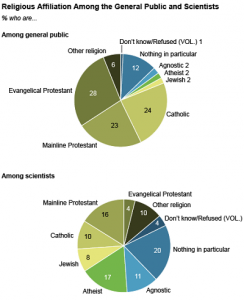 How do the numbers measure up to Mr. Krauss’ thesis?┬á A survey of scientists who are members of the American Association for the Advancement of Science, conducted by the Pew Research Center for the People & the Press in May and June 2009, finds that members of this group are, on the whole, much less religious than the general┬ápublic.┬á Indeed, the survey shows that scientists are roughly half as likely as the general public to believe in God or a higher power. According to the poll, just over half of scientists (51%) believe in some form of deity or higher power; specifically, 33% of scientists say they believe in God, while 18% believe in a universal spirit or higher power.┬á As for philosophers, 93% either doubt God or disbelieve in God, up from an astonishing 85% in 1933 and 73% in 1914
How do the numbers measure up to Mr. Krauss’ thesis?┬á A survey of scientists who are members of the American Association for the Advancement of Science, conducted by the Pew Research Center for the People & the Press in May and June 2009, finds that members of this group are, on the whole, much less religious than the general┬ápublic.┬á Indeed, the survey shows that scientists are roughly half as likely as the general public to believe in God or a higher power. According to the poll, just over half of scientists (51%) believe in some form of deity or higher power; specifically, 33% of scientists say they believe in God, while 18% believe in a universal spirit or higher power.┬á As for philosophers, 93% either doubt God or disbelieve in God, up from an astonishing 85% in 1933 and 73% in 1914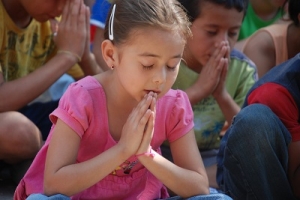 Thursday, August 20, Illinois Governor Rauner signed the┬á
Thursday, August 20, Illinois Governor Rauner signed the 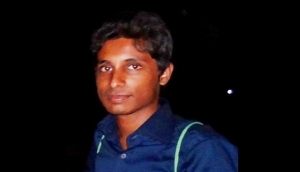 Police in Bangladesh have charged five suspected Islamic extremists with the murder of an atheist blogger, one of four secular writers hacked to death in the south Asian state this year.
Police in Bangladesh have charged five suspected Islamic extremists with the murder of an atheist blogger, one of four secular writers hacked to death in the south Asian state this year. A memorial held by SPI Coalition Michigan Atheists will take place on Sunday, September 13 in celebration of the life of longtime former Director Arlene-Marie. ┬áGeorge Shiffer, the current director, said, “A park was chosen for the venue, because Arlene like the out of doors very much.┬á Arlene was also widely known and very much liked, so the park can handle any number of attendees.┬á This celebration will be potluck, which would resemble Michigan Atheist’s annual picnics, an outdoor event that Arlene liked very much.”┬á All are welcome to
A memorial held by SPI Coalition Michigan Atheists will take place on Sunday, September 13 in celebration of the life of longtime former Director Arlene-Marie. ┬áGeorge Shiffer, the current director, said, “A park was chosen for the venue, because Arlene like the out of doors very much.┬á Arlene was also widely known and very much liked, so the park can handle any number of attendees.┬á This celebration will be potluck, which would resemble Michigan Atheist’s annual picnics, an outdoor event that Arlene liked very much.”┬á All are welcome to 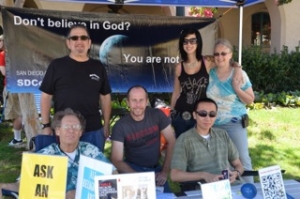 day in the park!┬á Join SPI Coalition Humanist Fellowship of San Diego this Saturday, September 12 at Balboa Park for their
day in the park!┬á Join SPI Coalition Humanist Fellowship of San Diego this Saturday, September 12 at Balboa Park for their 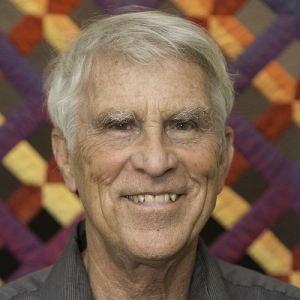 ÔÇ£They reject our religion and say we are not sufficiently Muslim, but they kill the men and rape the women. What kind of Islam is that?ÔÇØ says a refugee interviewed by SPI Fellow Mark Juergensmeyer during his July expedition to Iran and Turkey.┬á Find out the Sunni term for ISIS–hint it roughly translates to bullies in Arabic, how this terror group persists and much more in SPI Fellow Mark Juergensmeyer’s new article,
ÔÇ£They reject our religion and say we are not sufficiently Muslim, but they kill the men and rape the women. What kind of Islam is that?ÔÇØ says a refugee interviewed by SPI Fellow Mark Juergensmeyer during his July expedition to Iran and Turkey.┬á Find out the Sunni term for ISIS–hint it roughly translates to bullies in Arabic, how this terror group persists and much more in SPI Fellow Mark Juergensmeyer’s new article,  Secularism in the Age of ISIS.
Secularism in the Age of ISIS. 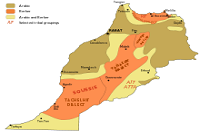
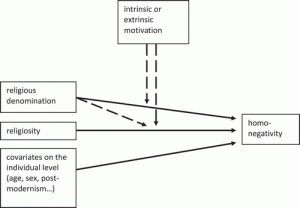
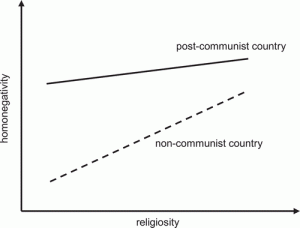 homonegativity can be investigated empirically. A positive association would mean that the positioning of a religion (in its writings, through its leadership, as well as its degree of fundamentalism) is reflected in the attitudes of the individual believer.
homonegativity can be investigated empirically. A positive association would mean that the positioning of a religion (in its writings, through its leadership, as well as its degree of fundamentalism) is reflected in the attitudes of the individual believer.